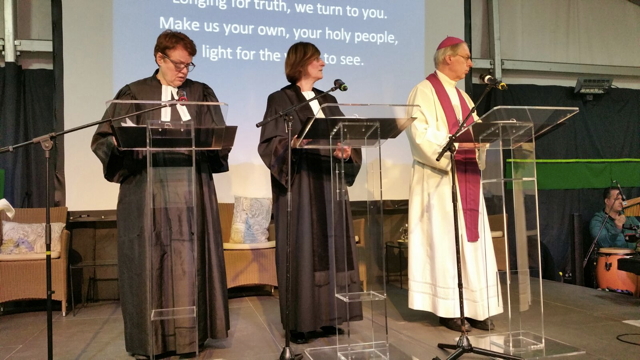
Oct 31, 2017 | Non categorizzato
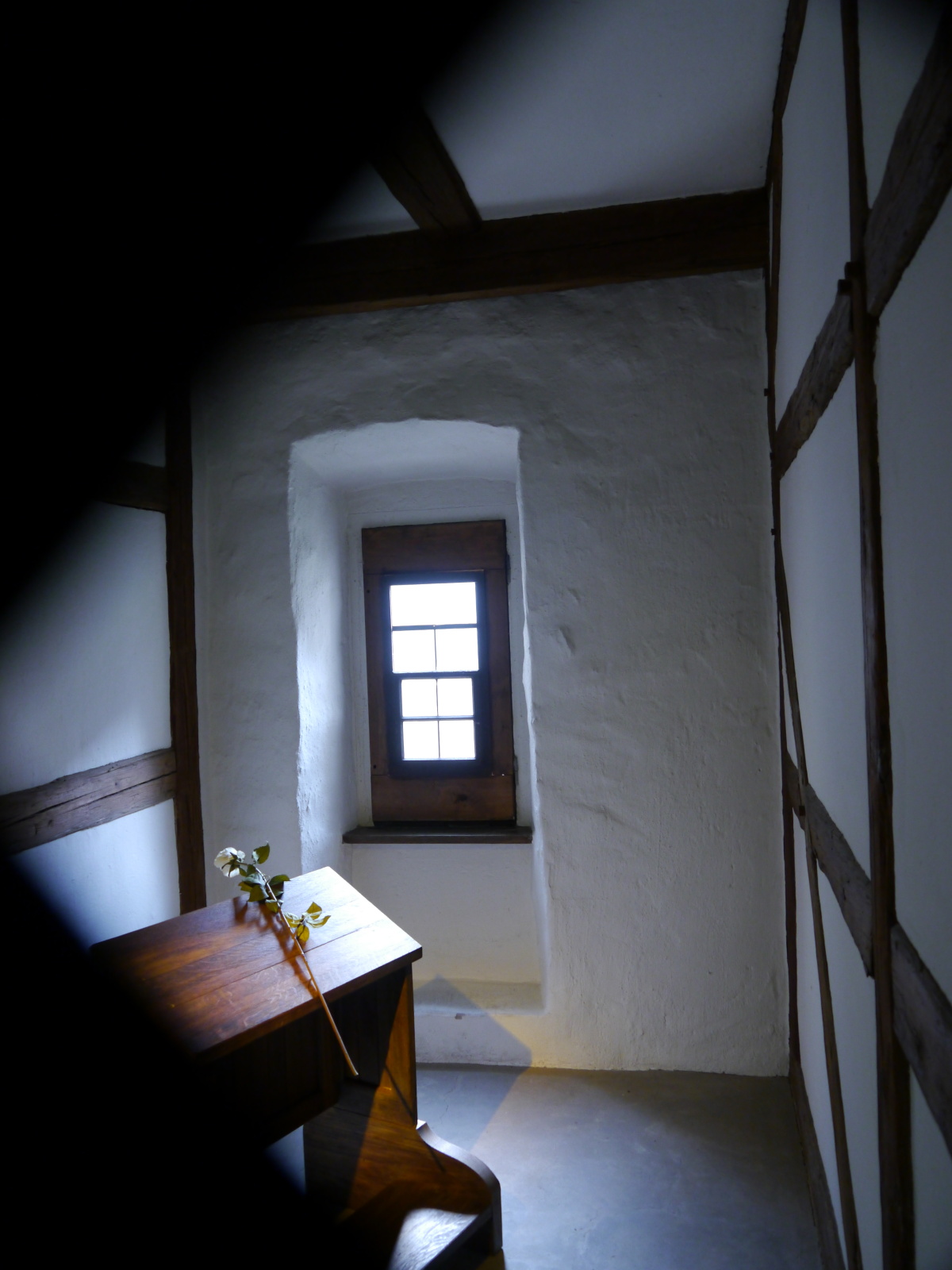
Erfurt: cell in Luther’s monastery
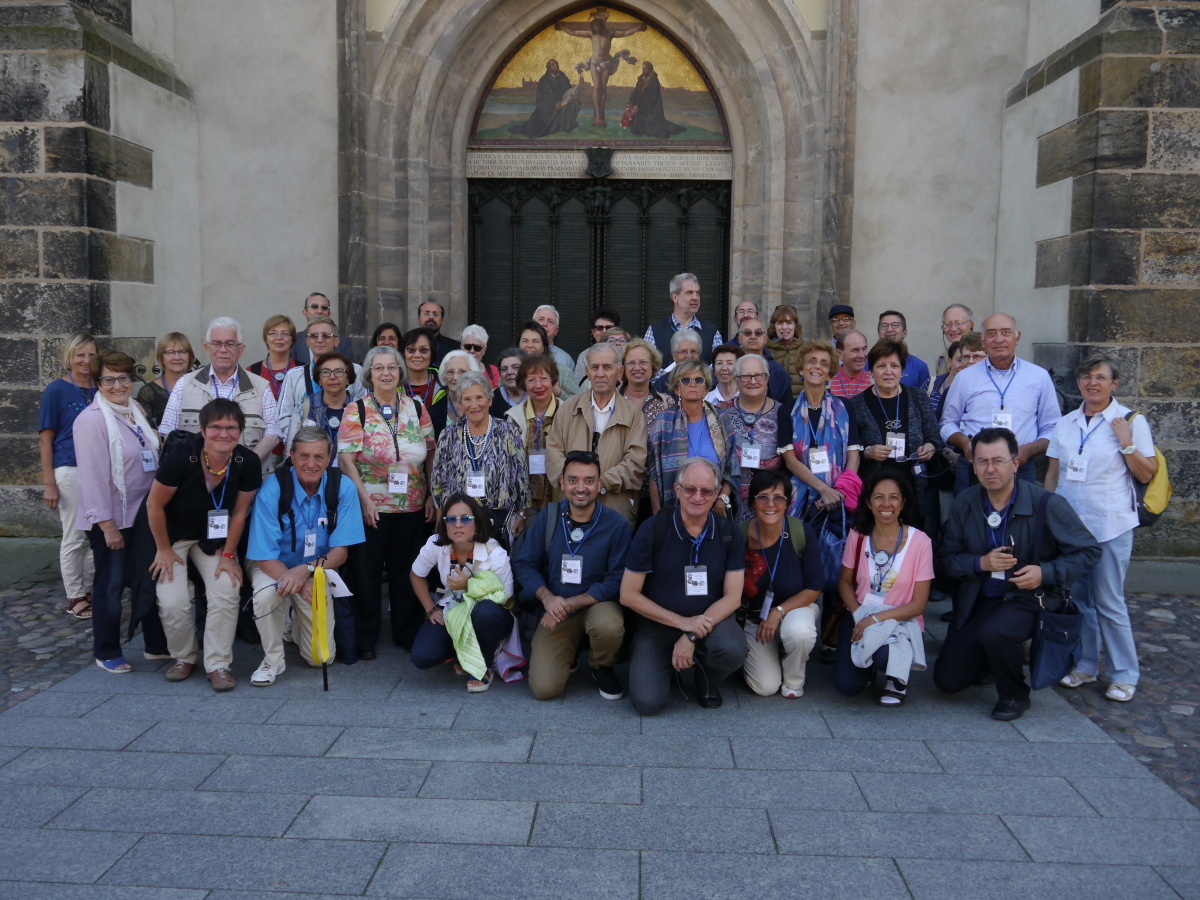 Throughout the year numerous encounters, conferences, ecumenical days and moments of common prayer in a variety of contexts and settings were held, almost always at local churches. They were opportunities to delve into the treasure of the different Christian traditions not only Catholic and Lutheran in a genuine family atmosphere. In May, during the Ecumenical Week called “Walking Together” and held at the Mariapolis Centre in Castel Gandolfo, Italy, Maria Voce spoke to 700 people from 42 countries and 69 different churches, identifying in the “five imperatives” of the Walking Together document the basis for any kind of fruitful ecumenical effort. Several presentations were made, including that of a new biography Lutero, L’uomo della Rivoluzione [Luther, the Man of the Revolution], written by Mario Dal Bello from Città Nuova. In Italy, the Focolare community held two evening programmes at Torino and Bra, with presentations by Hubertus Blaumeiser, a Catholic expert on Luther, and by Waldensian, Dr Paolo Ricca.
Throughout the year numerous encounters, conferences, ecumenical days and moments of common prayer in a variety of contexts and settings were held, almost always at local churches. They were opportunities to delve into the treasure of the different Christian traditions not only Catholic and Lutheran in a genuine family atmosphere. In May, during the Ecumenical Week called “Walking Together” and held at the Mariapolis Centre in Castel Gandolfo, Italy, Maria Voce spoke to 700 people from 42 countries and 69 different churches, identifying in the “five imperatives” of the Walking Together document the basis for any kind of fruitful ecumenical effort. Several presentations were made, including that of a new biography Lutero, L’uomo della Rivoluzione [Luther, the Man of the Revolution], written by Mario Dal Bello from Città Nuova. In Italy, the Focolare community held two evening programmes at Torino and Bra, with presentations by Hubertus Blaumeiser, a Catholic expert on Luther, and by Waldensian, Dr Paolo Ricca.  In Holland, leaders of the main Christian Churches began the Unity On the March Day. In Brazil, following a symposium promoted by the national ecumenical commission on Luther’s Comments on the Magnificat, there was an evening held at Mariapolis Ginetta which was followed via live streaming by many young people in 650 listening locations. In Venezuela several encounters and moments of prayer were held by the focolare communities. At Mariapolis Fiore in Poland the day event held in September for the 500th anniversary was the opportunity for a particular kind of witness: the fifteen year ecumenical pilgrimage shared by the people of Poland and Germany. In Ireland, on the initiative of the Focolare Movement and the Lutheran Church, studies were held, conference and an Ecumenical Bible week, which also involved the Anglican and Presbyterian Churches. There were also journeys to significant landmarks of the Reformation and of the life of Martin Luther. In the month of August, there was a seminar on Luther in Zwochau with fifty Catholics, Lutherans Waldensians and one Coptic-Orthodox, from several European countries, Egypt and Argentina. Included in the programme was a visit to Wartburg Castle and the city of Wittenberg, Effort where the young Luther entered the Augustinian Order, and Lipsia where his legacy met up with the musical genius of J. S. Bach. One Italian group visited another significant landmark, the city of Augusta, to get to know the Ecumenical Mariapolis of Ottmaring. A similar pilgrimage took place in June, promoted by the Ecumenical Commission of Hong Kong and accompanied by several focolarini. In Sweden, the Focolare community solemnly underwrote “the imperatives” and handed their signatures over to the Lutheran Archbishop. The Gen Verde performing arts group, through its concert concert “On the Other Side “, contributed to the commemoration in Stadthagen (Germany). These were but a few steps on a road that is still very long, which are added to many others that set the direction of the common search for truth and salvation, with an open gaze focused on all the Churches. It’s a new page in history.
In Holland, leaders of the main Christian Churches began the Unity On the March Day. In Brazil, following a symposium promoted by the national ecumenical commission on Luther’s Comments on the Magnificat, there was an evening held at Mariapolis Ginetta which was followed via live streaming by many young people in 650 listening locations. In Venezuela several encounters and moments of prayer were held by the focolare communities. At Mariapolis Fiore in Poland the day event held in September for the 500th anniversary was the opportunity for a particular kind of witness: the fifteen year ecumenical pilgrimage shared by the people of Poland and Germany. In Ireland, on the initiative of the Focolare Movement and the Lutheran Church, studies were held, conference and an Ecumenical Bible week, which also involved the Anglican and Presbyterian Churches. There were also journeys to significant landmarks of the Reformation and of the life of Martin Luther. In the month of August, there was a seminar on Luther in Zwochau with fifty Catholics, Lutherans Waldensians and one Coptic-Orthodox, from several European countries, Egypt and Argentina. Included in the programme was a visit to Wartburg Castle and the city of Wittenberg, Effort where the young Luther entered the Augustinian Order, and Lipsia where his legacy met up with the musical genius of J. S. Bach. One Italian group visited another significant landmark, the city of Augusta, to get to know the Ecumenical Mariapolis of Ottmaring. A similar pilgrimage took place in June, promoted by the Ecumenical Commission of Hong Kong and accompanied by several focolarini. In Sweden, the Focolare community solemnly underwrote “the imperatives” and handed their signatures over to the Lutheran Archbishop. The Gen Verde performing arts group, through its concert concert “On the Other Side “, contributed to the commemoration in Stadthagen (Germany). These were but a few steps on a road that is still very long, which are added to many others that set the direction of the common search for truth and salvation, with an open gaze focused on all the Churches. It’s a new page in history.
Listen to interview given to the BBC Radio (Ulster) by Swiss theologian Fr Hubertus Blaumeiser during the Sunday Sequence program on The Reformation (30/10/2017). Fr Blaumeiser is recognised as one of the leading authorities on Luther. http://www.bbc.co.uk/programmes/p05lc3dn
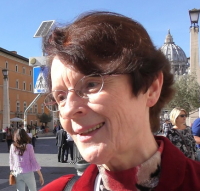
Oct 30, 2017 | Non categorizzato
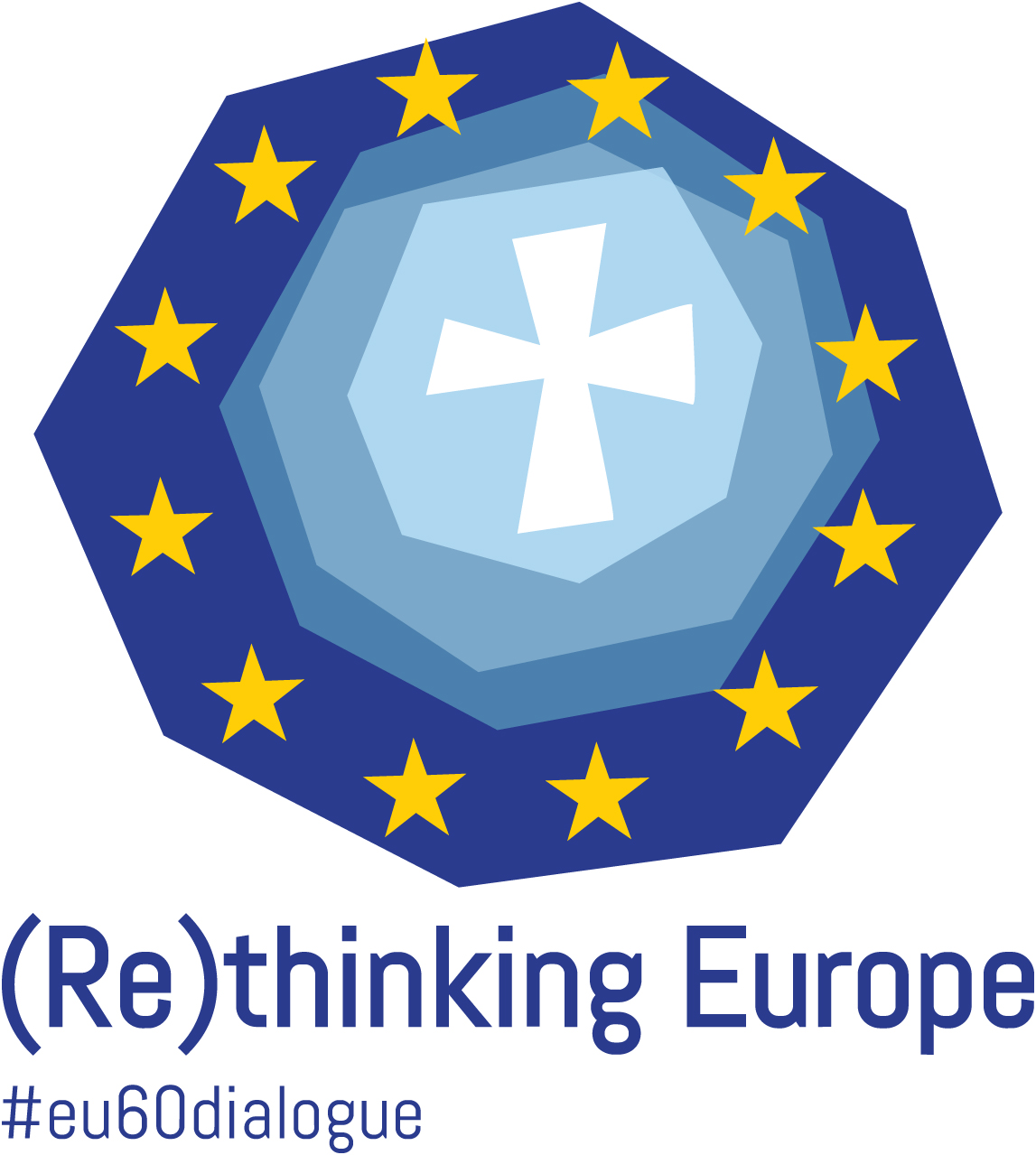 The convention entitled“(Re)Thinking Europe. A Christian contribution to the future of the Project for Europe” was held in the Vatican from 27 to 29 October. It was organised by the Commission of the European Bishops’ Conference (COMECE) in cooperation with the Secretary of State. “The commitment of Christians has to constitute a promise of peace,” Pope Francis said at the conclusion of the works. This is not “a time to build trenches, but rather, to work to fully pursue the dream of the Founding Fathers of a united and peaceful Europe, a community of peoples who want to share a future of development and peace.”
The convention entitled“(Re)Thinking Europe. A Christian contribution to the future of the Project for Europe” was held in the Vatican from 27 to 29 October. It was organised by the Commission of the European Bishops’ Conference (COMECE) in cooperation with the Secretary of State. “The commitment of Christians has to constitute a promise of peace,” Pope Francis said at the conclusion of the works. This is not “a time to build trenches, but rather, to work to fully pursue the dream of the Founding Fathers of a united and peaceful Europe, a community of peoples who want to share a future of development and peace.”

Ilona Toth
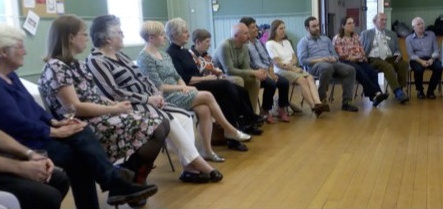
Oct 30, 2017 | Non categorizzato
 A small crowd gathered together despite the pouring rain and there was a tree of stylized branches on which many peace messages sprouted like leaves. This is just one of the more recent snapshots of an ongoing friendship between the Focolare community of Scotland and the Muslims of the Ahl Al Bait Society, founded in 1991 with the aim of promoting cultural legacy and religious faith of the Muslim minority in the country, and helping it to integrate into its social context. Together, the two communities have been promoting for some time now, moments of sharing, encounter and common prayer, where interreligious dialogue is proposed as a key element to face and heal the many divisions that are dangerously affecting the social weft, not only in Europe. Last 19 September, umbrellas opened under a grey sky to give a colourful sign of this commitment. Among those attending the Wake for Peace and Hope were some civil and religious personages, among which were Lord Provost, representative of the city’s Municipal Council, Metropolitan Archbishop Emeritus of Glasgow, Mario Conti, and some exponents of the Muslim Council of Scotland.
A small crowd gathered together despite the pouring rain and there was a tree of stylized branches on which many peace messages sprouted like leaves. This is just one of the more recent snapshots of an ongoing friendship between the Focolare community of Scotland and the Muslims of the Ahl Al Bait Society, founded in 1991 with the aim of promoting cultural legacy and religious faith of the Muslim minority in the country, and helping it to integrate into its social context. Together, the two communities have been promoting for some time now, moments of sharing, encounter and common prayer, where interreligious dialogue is proposed as a key element to face and heal the many divisions that are dangerously affecting the social weft, not only in Europe. Last 19 September, umbrellas opened under a grey sky to give a colourful sign of this commitment. Among those attending the Wake for Peace and Hope were some civil and religious personages, among which were Lord Provost, representative of the city’s Municipal Council, Metropolitan Archbishop Emeritus of Glasgow, Mario Conti, and some exponents of the Muslim Council of Scotland. 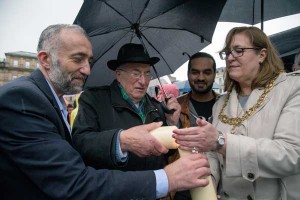 The organisers explained that this initiative was inspired by the appeal launched by Pope Francis for solidarity with Syrian people. Liz Taite of the Focolare Movement explained: “In a moment in which various circumstances are sowing division and conflicts, the Focolare Movement, together with people of different faiths, intends to publicly promote a message of peace. This event is the sign that God is at work and that peace is possible.” Azzam Mohammad, director of the Ahl Al Bait Society said: “Together we want to bring down the barriers, eliminate the fear and diffidence, and increase comprehension and mutual respect. We worked with sincerity and heartiness as a team, and it was a success. This is a step that marks the history of our common endeavours and will be an example for all the communities around us. Now we have started to plan for the next event.”
The organisers explained that this initiative was inspired by the appeal launched by Pope Francis for solidarity with Syrian people. Liz Taite of the Focolare Movement explained: “In a moment in which various circumstances are sowing division and conflicts, the Focolare Movement, together with people of different faiths, intends to publicly promote a message of peace. This event is the sign that God is at work and that peace is possible.” Azzam Mohammad, director of the Ahl Al Bait Society said: “Together we want to bring down the barriers, eliminate the fear and diffidence, and increase comprehension and mutual respect. We worked with sincerity and heartiness as a team, and it was a success. This is a step that marks the history of our common endeavours and will be an example for all the communities around us. Now we have started to plan for the next event.”  In August, Daniel, of Glasgow had participated in the Summer School Interfaith Engagement in Theory and Practice, a course/workshop dedicated to interreligious dialogue, and promoted for some years now by the Sophia University Institute and the Risalat Institute of Qum (Iran) in Tonadico, Northern Italy. This year the participants came from Canada, Europe and the United States. “I think that my city can understand the values of multiculturalism and integration. When we are united and supportive, and you recognise your own values in those who, at first sight, seem to be different, we can face the daily battles in a different way. These encounters between different faiths and cultures are testimonies of how unity is possible even when we are different. This diversity strengthens us and reminds us to greet each other as brothers and sisters, welcoming each other with open arms and a smile. We all can become messengers of hope and peace and engines of change.”
In August, Daniel, of Glasgow had participated in the Summer School Interfaith Engagement in Theory and Practice, a course/workshop dedicated to interreligious dialogue, and promoted for some years now by the Sophia University Institute and the Risalat Institute of Qum (Iran) in Tonadico, Northern Italy. This year the participants came from Canada, Europe and the United States. “I think that my city can understand the values of multiculturalism and integration. When we are united and supportive, and you recognise your own values in those who, at first sight, seem to be different, we can face the daily battles in a different way. These encounters between different faiths and cultures are testimonies of how unity is possible even when we are different. This diversity strengthens us and reminds us to greet each other as brothers and sisters, welcoming each other with open arms and a smile. We all can become messengers of hope and peace and engines of change.”
Oct 29, 2017 | Non categorizzato, Spiritualità, Word of
for ages 4-8 | for ages 9-17 | Print | Audio Jesus was speaking to the crowds that followed him, telling them about the new lifestyle of those who want to be his disciples, a way of life that went “against the current” in comparison to the usual way of thinking (see Mt 23:1–11). In his day (and today, too) it was easy to talk in high moral terms and then not live accordingly, seeking prestige in society, wanting to be seen or using others for personal advantage. Jesus asks his disciples to have a completely different logic when relating to others, as he himself had: “The greatest among you will be your servant.” At a September 1982 meeting in Payerne, Switzerland, Chiara Lubich shared her spiritual experience with people who wanted to discover how to live out the Gospel: “We must keep our gaze fixed on the one Father of so many children, and then consider all people as children of that one Father … “Jesus, who is our model, taught us two things that are ultimately one: to be children of our one Father and to be brothers and sisters to one another … God was calling us to universal brotherhood and sisterhood.” This is what is new, to love everyone just as Jesus did, because all people — you and me and every person on the face of the earth — are children of God, who have always been loved and wanted by him. In this way, we discover that the brother or sister we should love in concrete ways (with our muscles too) is every single person we meet on a daily basis. This means my dad, my mother-in-law and my rebellious child. It means someone in prison, a street beggar, someone who is disabled, my manager and the cleaners at work. It means my colleague in a political party and the person who has different political opinions than I do. It means people of our faith and culture, as well as foreigners. The characteristically Christian attitude toward every brother or sister is to serve them. “The greatest among you will be your servant.” “To strive for the primacy of the Gospel by putting ourselves at the service of everyone,” Chiara continued, “what is the best way to serve? “To make ourselves one with everyone we meet, feeling what they feel within ourselves: helping as though their problems were our own, made ours by love … No longer living just thinking of ourselves but seeking to bear other people’s burdens and to share their joys.” Each of our skills and good points, all that we might feel “great” about, is an opportunity to serve that should not be lost. Our work skills, our artistic talents, our knowledge, but also being able to laugh or make people laugh — or the time given to listening to someone who is unsure about what to do or who is in difficulty. There’s the energy of youth, but also the power of prayer, when physical strength lessens. “The greatest among you will be your servant.” Sooner or later, this selfless Gospel love kindles within the heart of our brothers and sisters the same desire to share, renewing relationships in the family, the parish, in workplaces and places where people relax, laying the foundations for a new society. Here’s an experience from Hermez, a teenager from the Middle East: “It was Sunday, and as soon as I woke up I asked Jesus to help me love all day long. I realized my parents had gone to an early Mass, and it occurred to me to clean and tidy the house. “I tried to do everything well, even putting some flowers on the table! Then I prepared breakfast and set the table. “When they came back, my parents were surprised and happy seeing all I had done. That Sunday, breakfast together was especially joyful; we spent time talking about many things, and I was able to share many experiences I had had that week. “That small act of love had set the tone for a fantastic day! By Letizia Magri
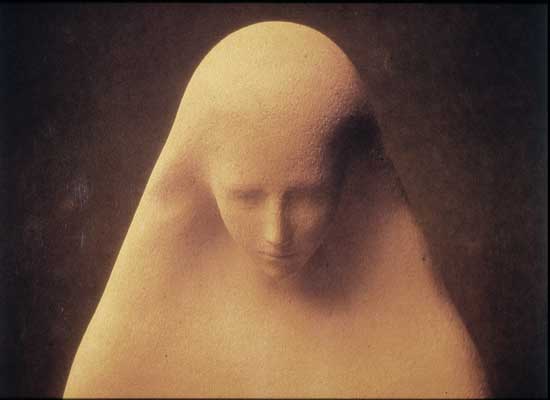
Oct 28, 2017 | Non categorizzato

Ave Cerquetti, ‘Mater Christi’ – Rome, 1971
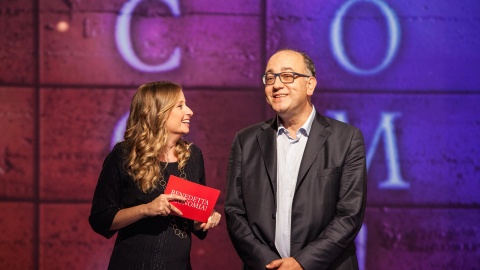
Oct 28, 2017 | Non categorizzato
 What connections can there be among the Bible and work, business, finance? Beginning tomorrow, an eight part series on Tv2000 with Luigino Bruni, focolarino, economist and passionate Bible enthusiast, instructor at Lumsa University in Rome, Italy, and Sophia University Institute in Loppiano, Italy. He will discuss with political world figures, labour union members and with workers, managers, business people who will present their testimonies of an economy oriented towards the human person. Based on the Economy of Communion, which considers as actors in the economy all those people that are not content with just turning a profit or themselves, but are open to the needs of the poorer folks, involving business owners, leaders and workers, students and ordinary citizens in the application of an economic culture that is marked by communion and reciprocity. In each episode a new connection will be made between a Bible passage and an aspect of the economy. The series will offer an opportunity to reflect on the original reasons, but also the current reasons for the inequity in the social fabric: insecurity, speculative logic, injustice, market intrusion in the public sphere and insecurity. There will also be business people and workers in the studio and via satellite to focus attention on small and medium-sized companies that have already exprienced success combining justice and market, profit and the common good, employment and solidarity. Beginning from the account of the Israelites in Egypt, found in the Book of Exodus, it considers the defence of workers rights. The second episode is an economic reading of the parable of the Prodigal Son and a comparison of themes of mercy and forgiveness with stories of business owners who have founded their business on a model of acceptance and sharing. A passage from Isaiah will raise a discussion in the episode dedicated to the “sacrificial model” adopted by many career managers, and by others that have been refuted in favour of free choice. A review of the story of Job, who falls into ruin and believes he is guilty, will be used to reflect on the hidden risks of the cult of merit. A page from the book of Jeremiah dedicated to false idols, will analyze the some of the motives that push many men and women of today into buying and consumerism on holy days, succumbing to the logic of the market square. Poverty and wealth will be themes of the sixth episode, in which the provocation of the Beatitudes will be confronted with the tendency to hide the value and meaning of poverty, sobriety and acceptance. The reading of the story of the Tower of Babel, mother of all failed businesses, will help to understand the errors that still today can lead a business into failure or towards mistaken ethical and social choices, and to discuss the social and economic consequences of organized crime. Finally, in the last episode, the reading of the story of Noah’s Ark will provide the opportunity to reflect on the “builders of arks of hope” that are still present in our day, with several stories of people that were able to veer in a different direction after very negative expriences, towards a more positive future for themselves and others.
What connections can there be among the Bible and work, business, finance? Beginning tomorrow, an eight part series on Tv2000 with Luigino Bruni, focolarino, economist and passionate Bible enthusiast, instructor at Lumsa University in Rome, Italy, and Sophia University Institute in Loppiano, Italy. He will discuss with political world figures, labour union members and with workers, managers, business people who will present their testimonies of an economy oriented towards the human person. Based on the Economy of Communion, which considers as actors in the economy all those people that are not content with just turning a profit or themselves, but are open to the needs of the poorer folks, involving business owners, leaders and workers, students and ordinary citizens in the application of an economic culture that is marked by communion and reciprocity. In each episode a new connection will be made between a Bible passage and an aspect of the economy. The series will offer an opportunity to reflect on the original reasons, but also the current reasons for the inequity in the social fabric: insecurity, speculative logic, injustice, market intrusion in the public sphere and insecurity. There will also be business people and workers in the studio and via satellite to focus attention on small and medium-sized companies that have already exprienced success combining justice and market, profit and the common good, employment and solidarity. Beginning from the account of the Israelites in Egypt, found in the Book of Exodus, it considers the defence of workers rights. The second episode is an economic reading of the parable of the Prodigal Son and a comparison of themes of mercy and forgiveness with stories of business owners who have founded their business on a model of acceptance and sharing. A passage from Isaiah will raise a discussion in the episode dedicated to the “sacrificial model” adopted by many career managers, and by others that have been refuted in favour of free choice. A review of the story of Job, who falls into ruin and believes he is guilty, will be used to reflect on the hidden risks of the cult of merit. A page from the book of Jeremiah dedicated to false idols, will analyze the some of the motives that push many men and women of today into buying and consumerism on holy days, succumbing to the logic of the market square. Poverty and wealth will be themes of the sixth episode, in which the provocation of the Beatitudes will be confronted with the tendency to hide the value and meaning of poverty, sobriety and acceptance. The reading of the story of the Tower of Babel, mother of all failed businesses, will help to understand the errors that still today can lead a business into failure or towards mistaken ethical and social choices, and to discuss the social and economic consequences of organized crime. Finally, in the last episode, the reading of the story of Noah’s Ark will provide the opportunity to reflect on the “builders of arks of hope” that are still present in our day, with several stories of people that were able to veer in a different direction after very negative expriences, towards a more positive future for themselves and others.

 Throughout the year numerous encounters, conferences, ecumenical days and moments of common prayer in a variety of contexts and settings were held, almost always at local churches. They were opportunities to delve into the treasure of the different Christian traditions not only Catholic and Lutheran in a genuine family atmosphere. In May, during the Ecumenical Week called “Walking Together” and held at the Mariapolis Centre in Castel Gandolfo, Italy, Maria Voce spoke to 700 people from 42 countries and 69 different churches, identifying in the “five imperatives” of the Walking Together document the basis for any kind of fruitful ecumenical effort. Several presentations were made, including that of a new biography Lutero, L’uomo della Rivoluzione [Luther, the Man of the Revolution], written by Mario Dal Bello from Città Nuova. In Italy, the Focolare community held two evening programmes at Torino and Bra, with presentations by Hubertus Blaumeiser, a Catholic expert on Luther, and by Waldensian, Dr Paolo Ricca.
Throughout the year numerous encounters, conferences, ecumenical days and moments of common prayer in a variety of contexts and settings were held, almost always at local churches. They were opportunities to delve into the treasure of the different Christian traditions not only Catholic and Lutheran in a genuine family atmosphere. In May, during the Ecumenical Week called “Walking Together” and held at the Mariapolis Centre in Castel Gandolfo, Italy, Maria Voce spoke to 700 people from 42 countries and 69 different churches, identifying in the “five imperatives” of the Walking Together document the basis for any kind of fruitful ecumenical effort. Several presentations were made, including that of a new biography Lutero, L’uomo della Rivoluzione [Luther, the Man of the Revolution], written by Mario Dal Bello from Città Nuova. In Italy, the Focolare community held two evening programmes at Torino and Bra, with presentations by Hubertus Blaumeiser, a Catholic expert on Luther, and by Waldensian, Dr Paolo Ricca.  In Holland, leaders of the main Christian Churches began the Unity On the March Day. In Brazil, following a symposium promoted by the national ecumenical commission on Luther’s Comments on the Magnificat, there was an evening held at Mariapolis Ginetta which was followed via live streaming by many young people in 650 listening locations. In Venezuela several encounters and moments of prayer were held by the focolare communities. At Mariapolis Fiore in Poland the day event held in September for the 500th anniversary was the opportunity for a particular kind of witness: the fifteen year ecumenical pilgrimage shared by the people of Poland and Germany. In Ireland, on the initiative of the Focolare Movement and the Lutheran Church, studies were held, conference and an Ecumenical Bible week, which also involved the Anglican and Presbyterian Churches. There were also journeys to significant landmarks of the Reformation and of the life of Martin Luther. In the month of August, there was a seminar on Luther in Zwochau with fifty Catholics, Lutherans Waldensians and one Coptic-Orthodox, from several European countries, Egypt and Argentina. Included in the programme was a visit to Wartburg Castle and the city of Wittenberg, Effort where the young Luther entered the Augustinian Order, and Lipsia where his legacy met up with the musical genius of J. S. Bach. One Italian group visited another significant landmark, the city of Augusta, to get to know the Ecumenical Mariapolis of Ottmaring. A similar pilgrimage took place in June, promoted by the Ecumenical Commission of Hong Kong and accompanied by several focolarini. In Sweden, the Focolare community solemnly underwrote “the imperatives” and handed their signatures over to the Lutheran Archbishop. The Gen Verde performing arts group, through its concert concert “On the Other Side “, contributed to the commemoration in Stadthagen (Germany). These were but a few steps on a road that is still very long, which are added to many others that set the direction of the common search for truth and salvation, with an open gaze focused on all the Churches. It’s a new page in history.
In Holland, leaders of the main Christian Churches began the Unity On the March Day. In Brazil, following a symposium promoted by the national ecumenical commission on Luther’s Comments on the Magnificat, there was an evening held at Mariapolis Ginetta which was followed via live streaming by many young people in 650 listening locations. In Venezuela several encounters and moments of prayer were held by the focolare communities. At Mariapolis Fiore in Poland the day event held in September for the 500th anniversary was the opportunity for a particular kind of witness: the fifteen year ecumenical pilgrimage shared by the people of Poland and Germany. In Ireland, on the initiative of the Focolare Movement and the Lutheran Church, studies were held, conference and an Ecumenical Bible week, which also involved the Anglican and Presbyterian Churches. There were also journeys to significant landmarks of the Reformation and of the life of Martin Luther. In the month of August, there was a seminar on Luther in Zwochau with fifty Catholics, Lutherans Waldensians and one Coptic-Orthodox, from several European countries, Egypt and Argentina. Included in the programme was a visit to Wartburg Castle and the city of Wittenberg, Effort where the young Luther entered the Augustinian Order, and Lipsia where his legacy met up with the musical genius of J. S. Bach. One Italian group visited another significant landmark, the city of Augusta, to get to know the Ecumenical Mariapolis of Ottmaring. A similar pilgrimage took place in June, promoted by the Ecumenical Commission of Hong Kong and accompanied by several focolarini. In Sweden, the Focolare community solemnly underwrote “the imperatives” and handed their signatures over to the Lutheran Archbishop. The Gen Verde performing arts group, through its concert concert “On the Other Side “, contributed to the commemoration in Stadthagen (Germany). These were but a few steps on a road that is still very long, which are added to many others that set the direction of the common search for truth and salvation, with an open gaze focused on all the Churches. It’s a new page in history.






 The organisers explained that this initiative was inspired by the appeal launched by Pope Francis for solidarity with Syrian people. Liz Taite of the Focolare Movement explained: “In a moment in which various circumstances are sowing division and conflicts, the Focolare Movement, together with people of different faiths, intends to publicly promote a message of peace. This event is the sign that God is at work and that peace is possible.” Azzam Mohammad, director of the Ahl Al Bait Society said: “Together we want to bring down the barriers, eliminate the fear and diffidence, and increase comprehension and mutual respect. We worked with sincerity and heartiness as a team, and it was a success. This is a step that marks the history of our common endeavours and will be an example for all the communities around us. Now we have started to plan for the next event.”
The organisers explained that this initiative was inspired by the appeal launched by Pope Francis for solidarity with Syrian people. Liz Taite of the Focolare Movement explained: “In a moment in which various circumstances are sowing division and conflicts, the Focolare Movement, together with people of different faiths, intends to publicly promote a message of peace. This event is the sign that God is at work and that peace is possible.” Azzam Mohammad, director of the Ahl Al Bait Society said: “Together we want to bring down the barriers, eliminate the fear and diffidence, and increase comprehension and mutual respect. We worked with sincerity and heartiness as a team, and it was a success. This is a step that marks the history of our common endeavours and will be an example for all the communities around us. Now we have started to plan for the next event.” 
